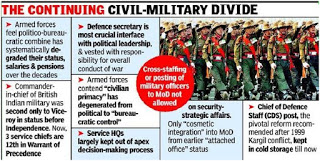NEW DELHI: The armed forces want at least five “core anomalies” in their salary structures to be resolved to establish the “correct baseline” for recommendations of the 7th Central Pay Commission (CPC), whose term has now been extended till December 31 by the government.
While the heat and dust over one rank, one pension (OROP) is yet to settle, with a section of veterans rejecting the “diluted” version announced by the government on September 5, the serving personnel have their own deep-seated grouse over their eroding “status, parity and equivalence” as compared to their civilian counterparts.
The armed forces top brass have made several representations to the government, including the defence and finance ministries, on the core anomalies over the last one year. But have received no assurance till now. With the 7th CPC’s term being extended by four months, they are now making a last-ditch attempt to get the anomalies rectified. One of the main demands is the grant of NFU (non-functional upgradation) for officers denied promotions due to the lack of vacancies in the steeply-pyramidal structure of the armed forces. “IFS and IPS officers, as also those from organized Group A civil services, now get NFU after the 6th CPC like IAS officers. But the armed forces have been kept out of it,” said a senior officer.
“This adversely impacts the morale of serving military officers. It also creates command, control and functional problems because even organizations that work closely with the military like DRDO, Border Roads Organisation, Military Engineer Service and the like get NFU,” he added.

Another demand is the placement of all Lt-Generals in the HAG+ (higher administrative grade) pay-scale like directors-general of police. “As of now, only 33% of Lt-Gens are in the HAG+ scale. The status of all Lt-Gens with that of DGPs must be restored,” he added.
The other anomalies deal with the grant of “uniform grade pay” and proper “initial pay fixation” of Lt-Colonels, Colonels and Brigadiers. There is also the need for all JCOs (junior commissioned officers) and soldiers to get “common pay scales”, in the backdrop of the ones recruited before January 2006 not getting them.
“Successive CPCs have given a raw deal to the armed forces compared to the bureaucracy. Virtually all IAS and IFS officers, for instance, reach the apex pay scale before their retirement due to NFU. They, therefore, get OROP through the backdoor. It’s high time the historical and traditional parity was restored,” said another officer.
The civilian bureaucracy, however, is not impressed. It feels the armed forces keep on making “more and more demands” when they already get a lot of privileges from free rations to hugely-subsidized canteens. “Military officers and jawans already get ‘military service pay’ for their tougher working conditions. The demand for NFU is unrealistic,” said a senior bureaucrat.
